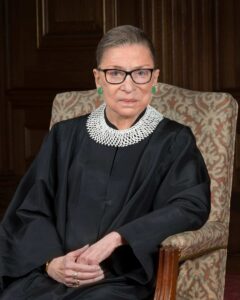Tag: Maura Campbell ’22
Remembering Justice Ruth Bader Ginsburg: Looking Back on the Notorious RBG’s Legacy
by The Cowl Editor on October 1, 2020
In Memoriam

by Maura Campbell ’22
News Staff
Ruth Bader Ginsburg—Supreme Court Justice, feminist, and cultural icon—passed away in her Washington, D.C. home on Friday, Sept. 18, at the age of 87. Ginsburg died due to complications related to pancreatic cancer, for which she had been treated since her diagnosis in 2009.
The Supreme Court announced Justice Ginsburg’s death in a statement on Friday night. “Our nation has lost a justice of historic stature,” Chief Justice John Roberts said. “We at the Supreme Court have lost a cherished colleague. Today we mourn, but with confidence that future generations will remember Ruth Bader Ginsburg as we knew her—a tireless and resolute champion of justice.”
Throughout her entire legal career, including her 27 years on the nation’s highest court, Ginsburg led the legal fight for women’s rights in the United States. Even before her appointment to the Supreme Court, Ginsburg changed the course of American law as a lawyer for the American Civil Liberties Union (ACLU) Women’s Rights Project, arguing several gender discrimination cases before the Supreme Court. The most notable of these cases include Reed v. Reed in 1971, which struck down an Idaho law favoring men over women in estate battles. This victory would eventually extend to the Equal Protection Clause of the 14th Amendment, barring laws that discriminated by sex. Other notable victories include Frontiero v. Richardson (1973), which barred gender discrimination in benefits of military members, and Weinberger v. Wiesenfeld (1975), which barred gender discrimination in state benefits.
Justice Ginsburg was appointed to the Supreme Court by former President Bill Clinton in 1993, where she continued her legal work as the second-ever woman on the Supreme Court. Finding herself consistently in the minority, Justice Ginsburg often used her extensive legal knowledge and talents to write passionate dissents on the Court’s majority opinions. Regarding these dissents, she said, “Dissents speak to a future age. It’s not simply to say, ‘My colleagues are wrong and I would do it this way.’ But the greatest dissents do become Court opinions and gradually over time their views become the dominant view. So that’s the dissenter’s hope: that they are writing not for today, but for tomorrow.”
Ruth Bader Ginsburg quickly became a cultural icon. By the time she was in her 80s, she was the subject of a documentary, a biopic, and an opera. She was portrayed in several episodes of “Saturday Night Live” and featured on a Time magazine cover. Nicknamed “Notorious RBG,” Justice Ginsburg was viewed as unbreakably intertwined with the fight for women’s rights and beloved by millions.
The response to Ginsburg’s death has been overwhelming. Former President Jimmy Carter described her as a “powerful legal mind and a staunch advocate for gender equality”; President Donald Trump called her “an amazing woman who led an amazing life”; Senator Chuck Schumer tweeted a statement describing her as “a giant in American history, a champion for justice, a trailblazer for women”; and Senator Bernie Sanders tweeted that Ginsburg “will be remembered as one of the great justices in modern American history.” Speaker of the House Nancy Pelosi ordered the flags at the Capitol to be flown at half-mast in Justice Ginsburg’s honor.
It is impossible to overstate the extent of Ruth Bader Ginsburg’s influence in the United States. Throughout her career, she broke countless barriers and defied numerous stereotypes. Ginsburg would often speak of how her family represented the American Dream: her mother was a factory worker, and Ruth, only one generation later, was a Supreme Court Justice.
Although Ruth Bader Ginsburg has died, her legacy will live on in the women whose lives she impacted and careers she made possible through her legal work.
Bursting the PC Bubble: Peace Talks Begin Between Taliban and U.S.
by The Cowl Editor on February 27, 2020
National and Global News

by Maura Campbell ’22
News Staff
On Saturday, February 15, the United States and the Afghan Taliban agreed on a weeklong, partial treaty in the hopes of beginning a movement towards peace. Although the deal is not a complete ceasefire, it was intended to decrease violence in the region for at least the seven days that it was officially in place.
If the violence is significantly decreased due to this treaty, U.S. and Taliban officials and negotiators plan to meet on Feb. 29 to start negotiations for the signing of a pact to end the 18-year-long war in Afghanistan.
Started in response to the September 11, 2001 attacks, the U.S. war in Afghanistan was intended to depose the Taliban government in Afghanistan, which had shielded al-Qaeda leader Osama Bin Laden while he planned the attacks. At nearly two decades long, it is the longest war in U.S. history.
In December 2019, The Washington Post began an investigation that revealed U.S. officials had been misleading the American public on the progress of the war. Confidential documents were released in which several senior U.S. officials expressed their frustrations with the war effort, conflicting with their public statements that positive progress was being made in Afghanistan.
Several months after the release of these documents describing the war as a “dysfunction” with 2,400 American lives lost, the U.S. Defense Department announced official plans to begin the process of negotiating for peace.
Secretary of State Mike Pompeo said that this pact would be a deal to “end the war in Afghanistan, reduce United States and Allied Forces presence, and ensure that no terrorist group ever uses Afghan soil to threaten the United States or our allies.”
One impediment to these peace talks is the Taliban’s demand that the U.S. remove all of its troops from Afghanistan, while the U.S. plans to keep about 9,000 troops in the region for counterterrorism operations. This conflict has been a barrier to peace talks for many years.
In addition, Afghanistan has its own domestic conflicts that may complicate peace negotiations. Ashraf Ghani was recently announced to have won a second term as president of Afghanistan—a contested election, since opponent Abdullah Abdullah has also declared victory in the presidential race. These complications will almost certainly slow down or otherwise complicate the long process of peace negotiations with the United States.
Regardless of these complications, the progress on peace has been widely recognized as a positive development. As the longest military conflict in U.S. history, the Afghanistan War has been a hot topic in politics for the past decade, with many Americans calling for an end to the war and peace in the region.
Overall, experts seem to view this potential for negotiation positively; North Atlantic Treaty Organization Secretary General Jens Stoltenberg said, “This could pave the way for negotiations among Afghans, sustainable peace, and ensuring the country is never again a safe haven for terrorists.” This message should give some hope to the American people.
Election of 2020: Iowa Caucuses Begin 2020 Election Season
by The Cowl Editor on February 6, 2020
National and Global News

by Maura Campbell ’22
News Staff
Candidates for the upcoming presidential election are making their last-minute campaign pushes as the early primaries begin. The Iowa caucuses to select the Democratic presidential nominee were held on Monday, February 3.
Reporting on the results of these caucuses has caused unusual controversy, as there were inconsistencies with the counting which continued into Tuesday. Current standings, with 71 percent of precincts reporting as of Tuesday afternoon, show Pete Buttigieg leading the polls for the Democratic Party, followed closely by Bernie Sanders.
According to the Iowa Democratic Party, the issue was not caused by any form of hack or intrusion, but rather by a reporting error with a new app used for calculations in the caucuses. Mandy McClure, director of communications for the Iowa Democratic Party, stated on Monday night, “The underlying data and paper trail is sound and will simply take time to further report the results.” Despite the early lack of results, several candidates gave victory-like speeches on Monday night.
Early primaries and caucuses are particularly important for candidates because they often provide an indication of how well a candidate will do in later primaries. Primaries to select the Democratic and Republican nominees for president begin in February and last through June, with the most important voting date being March 3, 2020.
On this day, known as Super Tuesday, the states of Alabama, Arkansas, California, Colorado, Maine, Massachusetts, Minnesota, North Carolina, Oklahoma, Tennessee, Texas, Utah, Vermont, and Virginia all hold their primaries.
Meanwhile, with President Trump’s impeachment trial coming to a close, the American public seems to be largely divided as to whether the Senate should remove Trump from office.
According to an NBC/Wall Street Journal poll released on Sunday, February 2, the majority of Americans do believe that the President is guilty of both articles of impeachment: abuse of power and obstructing Congress. However, public opinion is split along party lines as to whether these actions warrant his removal from office.
This opinion has stayed fairly consistent throughout the course of the trial. This new poll reports that 46 percent of registered voters support removing Trump from office while 49 percent do not; virtually unchanged from the even 48-to-48 percent ratio on the same question reported by NBC/Wall Street Journal’s December poll.
For non-registered voters, it is important to register as soon as possible in order to be able to cast a vote in your state’s primary election. Although many states allow for online voter registration, there are still several states that do not, meaning that registration may have different requirements. For information on how to register or how to vote in your home state with an absentee ballot, call your local town office or visit www.vote.org.
Bursting the PC Bubble: Impeachment Investigations Continue
by The Cowl Editor on November 7, 2019
National and Global News
by Maura Campbell ’22
News Staff
On Sept. 24, Speaker of the House Nancy Pelosi announced a formal impeachment inquiry into President Donald Trump. This inquiry came as a result of allegations of a quid pro quo involving the president withholding aid from Ukraine until they agreed to investigate former Vice President and Democratic presidential candidate Joe Biden’s business dealings there.
Quid pro quo, a situation in which one party offers an advantage or favor to another party in return for something else of value, is generally considered to be politically unfavorable and unethical. In particular, the Constitution of the United States says that “treason, bribery, or other high crimes and misdemeanors”—which is generally considered to encompass the concept of quid pro quo —are impeachable offenses.
These allegations, put forth originally by an unnamed whistleblower, resulted from a phone call between President Trump and Ukrainian President, Volodymyr Zelensky, during which President Trump encouraged Zelensky to investigate Biden in return for dispersing U.S. aid to Ukraine. This has been largely defined as a quid pro quo in which the President withheld aid in an attempt to tarnish his opponent and therefore advance himself politically.
President Trump has denied the existence of a quid pro quo during this phone call, releasing a rough transcript of the conversation and stating that he wanted Ukraine to investigate Biden due to worries regarding corruption in Ukraine, not in an attempt tarnish his political opponent.
Despite this, Pelosi said on Sept. 24, “The actions taken to date by the President have seriously violated the Constitution,” and that House committees would begin investigating these actions.
Over the next several weeks, six committees in the House of Representatives will investigate the allegations put forth against President Trump, and the Judiciary Committee will determine whether there is adequate evidence of wrongdoing.
If the Judiciary Committee finds sufficient evidence of wrongdoing by the President, they will produce a list of articles of impeachment, about which the House of Representatives will then hold a vote on. If a majority of the House votes to impeach, the proceedings will move to the Senate, which will then hold a trial. In the end, the Senate would require a two-thirds majority vote in order to remove President Trump from office.
Since Pelosi’s announcement of the impeachment inquiry, reactions from media and citizens have been mixed and largely divided across partisan lines.
A recent poll by NBC and the Wall Street Journal found that 49 percent of Americans are in favor of impeaching and removing President Trump from office. In particular, 88 percent of Democrats support impeachment and removal from office, whereas 90 percent of Republicans oppose impeachment and removal from office.
This is a developing story, with new polls and updates being released daily. Students interested in keeping up to date with this process should be aware that the Phillips Memorial Library offers free student subscriptions to the New York Times and the Wall Street Journal, which can be accessed through their respective websites.

photo courtesy of flickr.com
Working for Greater Equality On-Campus: College Responds to Call for Greater Inclusion and Diversity
by The Cowl Editor on October 31, 2019
Campus
by Maura Campbell ’22
News Staff
On Monday, October 21, the Providence College student body received an email from Rev. Brian Shanley, O.P., president of the College, informing students, staff, and faculty of an update by the Office of Institutional Diversity, Equity, and Inclusion (IDEI). The email provided general information regarding IDEI’s recent work to promote diversity on campus, and specifically addressed some potential issues previously raised about the elementary and special education department.
In light of recent claims that the Department of Elementary and Special Education has not been an inclusive department and major on campus, IDEI has partnered with the department to help to create a more inclusive environment.
In reference to the ESE department, the email also mentioned Jennifer Swanberg, dean of the school of professional studies, high lightingher work “to develop a cultural transformation process with the goal of ensuring that all ESE faculty and staff are equipped with the evidence-based skills, knowledge, and competencies to foster this type of inclusive environment.”
In particular, the email included a flyer that was distributed at IDEI’s recent meeting, explaining their major initiatives. These initiatives include the Diversity Strategic Directions Steering Committee, a committee to help engage internal leaders in a conversation about diversity and create a clear plan and direction for diversity, and Advocates for Beloved Community (ABC), a team promoting racial justice and reconciliation on campus and addressing Title VI racial bias incidents.
The flyer also detailed IDEI’s five focus areas for 2019-2020. This strategic plan, known as PC200, hopes to promote diversity, equity, and inclusion at PC through these focus areas, “ranging from structural diversity, access, and equity, to student learning and development—and has developed relationships with a diverse team of campus partners to address these areas through educational training, specific programming, departmental counseling, and other initiatives,” Shanley said.
These five focus areas are structural diversity, access, and equity, institutional infrastructure, climate and intergroup relations, formal and informal curricula, and student learning and development.
In addition, the flyer included information about events and programming held at the Center at Moore Hall. This programming includes the Urban Dance Series, classes on diverse dance styles and culture held by Providence-based dancers and educators. Other programming includes Conversations for Change, a set of workshops inspired by Rev. Dr. Martin Luther King Jr., promoting “nonviolence, consensus building, and civic action,” and the World Cinema Series, a PC faculty-hosted program centered around “the film traditions and innovation of different countries throughout the world.”
This email highlights the work of the Office of Institutional Diversity, Equity, and Inclusion in recent and upcoming months. This work to promote diversity and inclusion is “critical to the future success of Providence College,” Shanley said. He further added that “each of us is responsible for communicating and working together to translate this vision into action.”
IDEI’s dedication to promoting diversity and inclusivity at PC an important part of the College’s mission, and this update is relevant to students seeking resources and outlets on these issues. The goal of their work can be summed up in their mission statement: “Rooted in our Catholic and Dominican identity, the Office of Institutional Diversity, Equity, and Inclusion advances Providence College’s commitment to developing purposeful collaborations across all areas of the College and the greater community to foster an environment where people of all backgrounds, cultures, identities and perspectives can flourish.”
The Office of Institutional Diversity, Equity, and Inclusion can be reached at diversity@providence.edu or in their office in Harkins 312.

photo courtesy of publicdomainpictures.net
Helping Others Through Habitat for Humanity: Friars Open to Apply for This Year’s Spring Mission Trip
by The Cowl Editor on October 10, 2019
Campus

by Maura Campbell ’22
News Staff
With midterms approaching and schoolwork piling up, students may already be looking ahead to spring break. When planning whether to spend the week on vacation, at home, or somewhere else, many students are considering a different type of spring break experience: Habitat for Humanity’s spring service trip.
Habitat for Humanity, an international, nonprofit organization, is dedicated to building affordable and comfortable housing for families living in poverty.
Providence College’s Habitat for Humanity chapter, in connection with Campus Ministry, has sent hundreds of students on service trips and events. In particular, PC’s chapter is now preparing for their 2020 spring break service trip.
This trip is planned to take place March 7-14, 2020 and is part of the nationwide “Collegiate Challenge” program during which schools, including colleges and high schools, send student volunteers to different Habitat affiliates. Each of these trips is unique from year to year, including different projects, site managers, affiliate volunteers, and homeowners.
Students have found the Habitat for Humanity program rewarding, with overwhelmingly positive feedback. Many students sign up for multiple trips and events after their first experience.
Rob Lesch ’20, student coordinator of PC’s Habitat for Humanity chapter, spoke about his involvement and experience with the program. “The Habitat program at PC,” he says, “allows students to give back to people in need while forming life-long friendships with people they would never expect.”
Courtney Salinsky ’20, fundraising chair of PC’s chapter, agreed, saying, “I knew that [Habitat] would be something that I would enjoy, but I had no idea that it would be my favorite thing that I have been involved in at PC.”
One of the most notable aspects of the Habitat for Humanity spring break service trip is that the homeowners themselves are also involved with building the house. This allows volunteers to meet the future homeowners and get to know them and their story personally.
“It is so special,” Salinsky says, “to learn their story and know that you are contributing to them improving their lives.”
In addition, the program is also known for creating new connections and friendships on campus. Lesch spoke about some of the connections he’s made on Habitat trips, saying, “The people I’ve met through Habitat these past two years have become some of my best friends.”
Salinsky added, “My favorite thing about Habitat has been the people that it has brought into my life. Strangers that I used to pass walking around campus have become some of my best friends and have had a significant impact on my life.”
Throughout the year, PC’s Habitat chapter will be holding fundraising events to offset the cost of participation in the service trip, since they do not want cost to be a determining factor in students’ decision whether to participate.
This year’s spring break service trip costs $200,which covers all food, lodging, transportation, insurance, and Habitat fees, as well as the $50 deposit.
Students interested in getting involved with PC’s Habitat for Humanity chapter can reach out to rlesch@friars.providence.edu for more information and also follow @FriarsOnHabitat on Instragram.
Applications for the chapter’s 2020 spring break service trip can be found online and are due on Oct. 25.
Education Students Stand for Diversity: Press Event Addresses Lack of Teachers of Color in Rhode Island
by The Cowl Editor on October 3, 2019
Campus

by Maura Campbell ’22
News Staff
On Sept. 18, the Providence College Coalition Against Racism held a press event addressing issues within the Providence College Department of Elementary and Special Education.
Members of the student body and faculty received an email on the same day from Dr. Hugh Lena III, provost and senior vice president of academic affairs, addressing this press event and its content.
At the press event, members of the Providence College Coalition Against Racism argued that the discriminatory practices of the Department of Elementary and Special Education contribute to the low percentage of teachers of color in the state of Rhode Island.
According to the press release, these practices include denying equal access to the major “based on race, ethnicity, and bi-lingual status.”
Kai Burton ’18 said at the press event, “While I never thought that it would be this difficult, I recognize that the adversity I’ve been facing has been deficit-based criticism, racially charged rhetoric, and feeling powerless throughout the entire process.”
The press release contains several other personal stories from students detailing their own experiences of discrimination within the ESE department.
It also states that the department uses a two-track policy that privileges white students over students of color. This policy, according to the press release, includes issues such as the department encouraging white students who are struggling while discouraging students of color who are facing similar difficulties. Additionally, white students are being placed in “positive student-teaching classrooms” while students of color are placed in “deficit-focused classrooms and required to take non-college courses.”
In 2019, the Elementary and Special Education graduating class consisted of 53 students, only two of whom were students of color. A year earlier, in 2018, there were only four students of color in a graduating class of 59.
Dr. Anthony Rodriguez, professor of elementary and special education, also spoke at the press event, describing some of the issues and discriminatory practices within his department. He said that the department “over many years, in a controlled, focused and deficit-oriented manner, removed people of color from the Elementary and Special Education program.”
Later, he spoke in further detail about these issues. In particular, he spoke about the department itself and its administration, saying that they “are not owning the problem and admitting harm,” which he says is crucial to solving the problem itself.
Rodriguez also spoke about issues of bias within the Elementary and Special Education Department outside of the classroom, saying that when he suggested a study abroad program in Latin America, rather than in Europe (where many study abroad programs in the ESE department are currently held), he was told that “these countries are dangerous and that there are no rigorous academic programs in Latin America.”
Dr. Jennifer Swanberg, dean of the school of professional studies, spoke about these concerns and explained her efforts to resolve some of these issues since arriving at PC in August of 2018.
Two of her priorities, she says, are to create “a learning, living, and working environment where everyone feels included and has equitable opportunities for success” and to “work toward creating a fully inclusive and equitable school that embodies the principles of equity and inclusion.”
In light of these priorities, Swanberg noted several efforts that have been made to recruit and retain students in the major, including “addressing the cost burden of the required admission tests, ongoing curriculum changes, removal of biases in state-required admission criteria, and the establishment of a ‘first-year experience’ for ESE students.”
Rodriguez, on the other hand, says that these types of efforts are not enough; rather, that they are intended to “manage” the problem rather than truly address it. Students, he says, are “feeling disheartened regarding the lack of response by the administration” and are still discussing how they are “spotlighted in class and treated as ‘the other.‘” He argues that if the department were truly changing, students would notice a difference. Instead, they continue to feel as if they are being ignored.
Swanberg says, “Their [students’] voices have not been ignored nor dismissed,” their input “has been used to inform change,”and that she continues to seek input from everyone on these issues.
In regard to the efforts put forth by the department, Swanberg notes that addressing issues within the Elementary and Special Education Department itself is not an immediate transformation. “Changing organizational culture and climate is hard work. It requires transformation at the individual and institutional levels, and it is developmental, iterative, a long-term process, and a work in progress.”
Rodriguez says that the Providence College Coalition Against Racism “hope[s] that the administration is acting and doing the work necessary for real structural changes in the ESE department so that any student can be themselves, work toward their dreams, and be a teacher without discrimination or retaliation.”
Making Connections One Day at a Time: Class of 2023 Participates in Annual Connections Retreat
by The Cowl Editor on September 19, 2019
Campus

by Maura Campbell ’22
News Staff
This weekend, freshmen took part in the annual Connections Retreat at Toah Nipi Retreat Center in Rindge, New Hampshire. Every year, Campus Ministry holds this retreat for first-year students. Prior to the retreat, several of the retreat leaders offered a behind-the-scenes account of their Connections experience.
Maggie McKenna ’20 described Connections as “one of the first chances the freshmen get to go off campus, unwind, and make friends with people who value and want similar things out of their college experience.” Since it is so early in the academic year, it can be an opportunity for first-year students to get to know other students they may not have had a chance to meet on campus.
The impact that Connections has on first-year students can be described best by the current leaders, who look back on their own retreats fondly. Kate Zenobio ’22 says that her Connections retreat in 2018 was “the first experience where [she] really saw the ‘Friar Family’ shine.”
Similarly, Abbie Wishart ’22 says, “Being a participant introduced me to so many amazing people in my class.” Students who have attended the retreat leave overwhelmingly positive feedback. The Connections Retreat will continue to run as it has in the past. This year’s leaders agree that the structure of the retreat has worked and they plan to keep it consistent with previous years. However, this does not mean that the retreat itself will always be exactly the same from year to year.
Although the general plan for the retreat remains generally the same from year to year,” says Brianna Waldmann ’21, “the community of retreatants and leaders is always changing, and this allows for a unique experience each time.” This combination of tradition and originality creates a special experience for each new Connections Retreat.
When asked about their favorite part of the weekend, each leader responded with enthusiasm. “My favorite part of the retreat,” Zenobio says, “is the transformation of the freshmen. I’m so excited for them to realize how electric the retreat will actually be. I would hope that they can come back to campus refreshed and take what they have learned from it and apply it to their everyday lives.”
Similarly, Matt McGurn ’20 says that his favorite part of the weekend is “the bus ride back, watching all the freshmen hang out and talk with all the new friends they have made.” He added, “They are always laughing, joking, and having a good time, as if they have been friends for years.”
The Connections Retreat gives freshmen the opportunity to take a break from the busyness of starting college, form new friendships, and reflect on the role of God in their lives.
If students are interested in getting involved with more retreats, or to go on their first retreat at Providence College, there are several different options available for students. There are several retreats coming up during this academic year, including the Men’s and Women’s Wilderness Retreats, the Lighthouse Retreat for sophomores, and the Encounter with Christ Retreat for all class years.
Students interested in getting involved with Campus Ministry can get involved in several different ways. They can become Peer Ministers or join a Peer Ministry Group. There are also several service trips and groups available, including a Habitat for Humanity trip, with which students are encouraged to get involved.
There are activities happening nearly every day through Campus Ministry, and many different organizations within Campus Ministry. All students are welcome to try getting involved through whichever avenues and organizations suit them best.
Diving Deeper: “Beyond Your News Feed” Podcast Hits PC Radiowaves
by The Cowl Editor on May 2, 2019
Campus

by Maura Campbell ’22
News Staff
Podcasts are quickly becoming a popular medium to educate, create, and explore. With all of the different options and podcast topics to choose from, the community here at Providence College may not be aware that the political science department has its own podcast, called Beyond Your News Feed: Understanding Contemporary Politics.
Beyond Your News Feed is a collaborative work that began in the fall of 2018 when Dr. Bill Hudson, chair of the political science department, spoke with Joe Carr ’83, associate vice president for marketing and communications, about the possibility of producing a podcast sponsored by the department.
Since then, Beyond Your News Feed has produced six episodes and will continue production in upcoming years. Dr. Hudson spoke about the content of the podcast and its future here at the College.
“We, as the title of the podcast suggests,” he said, “want to move beyond surface journalistic reporting on political events and provide listeners with historical background and analytical perspectives on what they read from their daily news sources.”
Essentially, the goal of Beyond Your News Feed is to dive deeper into political topics that surface-level news reporting may not fully explain.
The content of the podcast tends to vary depending on who is involved. “We have a deep and broad range of expertise in the political science department,” Hudson explained.
For example, the episode that featured Dr. Gizem Zencirci focused on Turkish politics, where the episode featuring Dr. Susan McCarthy focused on Chinese politics. Faculty members speak on the topics in which their expertise is centered. In addition, several episodes have been produced on American politics, including the 2018 midterm elections.
In addition, student involvement in Beyond Your News Feed has grown since the formation of the podcast.
Regan Wind ’20 works as a podcast engineer, managing production, editing, and uploading. In the future, more students in the department could become involved in the podcast, especially those working on research projects that could be used as topics for an episode.
Although Beyond Your News Feed is produced by members of the political science department, it is available as a resource to the entire Providence College community, including current students, alumni, and other faculty and staff.
“I hope students can gain more in-depth insights into political events by listening to Beyond Your News Feed,” Hudson said, explaining that the podcast, once it falls into a regular schedule, can be expected to comment on political events soon after they happen.
Members of the PC community who want to gain a more in-depth understanding of worldwide political events, regardless of their major or background, can access Beyond Your News Feed at www.soundcloud.com/pcpolysci or on an installed podcast app.
Release of Mueller Report Sparks Controversy
by The Cowl Editor on April 4, 2019
National and Global News

By Maura Campbell ’22
News Staff
In recent weeks, Robert Mueller completed his investigation of President Donald Trump. Although the full Mueller Report has yet to be released to the public, Attorney General William Barr released the Barr Report—a four-page summary of the Mueller investigation’s findings—on Sunday, March 24.
The Barr Report explains the results of the two-year investigation into whether the Trump campaign conspired with the Russian government during the 2016 election, as well as whether President Trump was guilty of obstruction of justice.
The report states that Mr. Mueller and his team of investigators did not find sufficient evidence to indicate that President Trump or his campaign colluded with the Russian government. The investigation did not reach a conclusion about whether the President obstructed justice.
The release of the Barr Report has caused mixed reactions among the media and the American people; a conclusion to this large-scale investigation of the president has been long awaited.
Due to the nature of the conclusion —that is, that the investigation team did not find sufficient evidence to prove President Trump’s guilt in either charge—many media outlets have called this a great political victory for Trump. The New York Times and AP News claim that a “cloud has lifted” over Trump’s presidency, as the release of the Barr Report has somewhat dimmed accusations of collusion.
However, not everyone has reached this conclusion as quickly. House Democrats have largely emphasized the line “while this report does not conclude that the President committed a crime, it also does not exonerate him,” from the Barr Report. This line shows the complexity of the investigation’s findings. It did not conclude whether or not the President obstructed justice, yet did not clear him either.
President Trump has declared the Barr report as a “complete and total exoneration,” despite the report’s statement that it does not, in fact, exonerate him. The President’s declaration of exoneration has been largely repeated by members of his administration, including White House Press Secretary Sarah Sanders, as well as by his fellow Republicans in Congress.
It is important to note, as well, that the Barr Report does not represent the full Mueller Report. The Barr Report is merely a four-page summary of the raw data found within the Mueller Report. Since the release of the Barr Report, there has been a public outcry for the full Mueller Report to be released to the public.
As of now, there is no set date for the Mueller Report to be released or a confirmation that it will even be released at all. Senate Majority Leader Mitch McConnell blocked a resolution on Monday that would allow the Mueller Report to be released to the public. The blocking of this resolution, which passed 420-0 in the House of Representatives, raised questions from the media and the public about McConnell’s motivations for keeping the Mueller Report confidential.
Regardless of the many differing interpretations of the Barr Report and its aftermath, it seems to be largely agreed upon that it represents a political victory for President Trump. Accusations of collusion have followed Trump’s presidency since he took office, and the Barr Report has certainly brought doubt to those claims.
